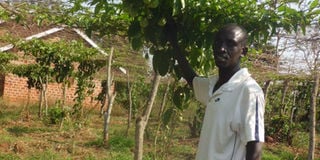He left teaching to grow passion fruits in Luwero

Sande Alex who is former teacher tends to his farm in Luweero. Photo by Lominda afedraru
What you need to know:
- Joseph Sande, quit teaching to follow his dream in farming, writes Lominda Afedraru.
A decision by Joseph Sande, to quit his teaching career and concentrate on passion fruit farming has catapulted him into being one of the successful passion fruit farmers in Uganda producing over 20 bags of passion fruits per harvest and earning over Shs7m.
The successes of the 33-year-old former teacher of agriculture has inspired several youths in his Kiziri village in Bamunanika, Luweero District into farming.
Having been raised in a rural and poor family set up, Sande knew that only self-determination and hard work would enable him make it in life.
He followed his dreams and attained a diploma in Education after which he got into the teaching profession.
“I taught for about three years but still felt empty. I had a strong conviction that I was not delivering my best in the world and had to evaluate myself about the right course I should take up to make things right.”
Based on the fact that Sande previously worked as a helper at Nakawa Market before going into teaching, it turned out that the happenings at the market had influenced and shaped his passion for the passion fruit.
“I was helping several farmers at Nakawa Market and I would look in amasement at the amount of cash they were pocketing from sales of the passion fruits. As time went on I believed that this was the right course for me and not teaching.”
According to Sande, after serious consultations with the famers and fellow teachers in Luweero District, he decided to relocate home and start a passion fruit garden. Sande then had to plan and eventually make that most dreaded decision of quitting his teaching profession and delving into the unchartered waters of farming.
“It was not an easy decision because the school administration had started valuing my work. I had risen to the rank of a class teacher and the in-charge of the school farm. The students and the teachers were like family. Therefore, it was not easy for me to just wake and tell them I had to leave but eventually, I painfully handed in my resignation to the board.”
Farming
Sande planted seedlings which he purchased from a friend.
They germinated but did not grow well although he managed to harvest passion fruits in the first season from October to December 2016 and earned about Shs18 million.
One day as he was harvesting some fruits, Dr Mike Ssali Segawa, an agronomist with expertise in passion fruit management was passing by.
He approached Sande and told him his plants were not doing well and he offered to assist him.
“I thought Ssali was a conman but he endeavored to convince me. I realised he was an agricultural scientist. He advised me to uproot the pest infested plants and replace them with clean seedlings which I did. You can now see that my farm has healthy plants. They are four months old and they have started giving fruits.”
Sande says Dr Ssali taught him how to apply fertilisers, recommending nitrogen, phosphorus and potassium (NPK) and calcium, ammonium, nitrate (CAN) fertilisers.
“He told me it is important to mix the fertilisers with foliar feed chemicals like super green, super grow, veg max which is spread on plant leaves to avoid pest and disease infestation,” he said.
Sande is growing the improved Masaka variety commonly known as Uganda Passion Fruit (UPF) 12 which is high yielding.
According to Sande, passion fruit farming requires a lot of common knowledge about management of the field and it is important to spend on fertilisers and other essential chemicals in order to obtain good yield.
He spends approximately Shs100, 000 to purchase chemicals in a period of three months to spray his farm.
From the sale of his previous harvest, he is constructing a permanent structure at Kiziri where he resides. He is also into seedling growing and sells each plant at Shs1, 500.
In a month he sells approximately 200 seedlings. In three months’ time he is expecting to harvest three sacks per week which will earn him on average Shs2.4m.
Challenges
His major challenge is the prolonged dry spell which arrive uninvited.
Sande also says he spends a lot of money on irrigation because the source of water is miles away from from the farm. “Sometimes it is hard to get water for my plants. Sometimes I find it hard to fight the pests,” said Sande.
Upon maturity, Sande says sometimes he is often overwhelmed by the big harvest. “Sometimes the fruits are too much that my stores get filled. I end up selling cheaply,” he reveals.
Sande says on bad days his farm is attacked by thieves who reap what they have not sowed. “The thieves are very many. They come in the night and harvest our fruits but these days we hire guards to keep watch in the night,” he said.
About passion fruits
Passion fruit is a perennial plant that allows farmers to enjoy yields for longer periods often exceeding three years depending on management.
Because of its flexibility, a farmer can inter crop passion fruit with crops like cow pea, onions, beet roots, spinach, strawberries and any other that does not share pest and diseases with the plant.
Common types include; purple and yellow passion fruit. The fruit is the new goldmine for farmers in Uganda and other East African region because it has become a new enterprise for farmers and gardeners as in generating income.




